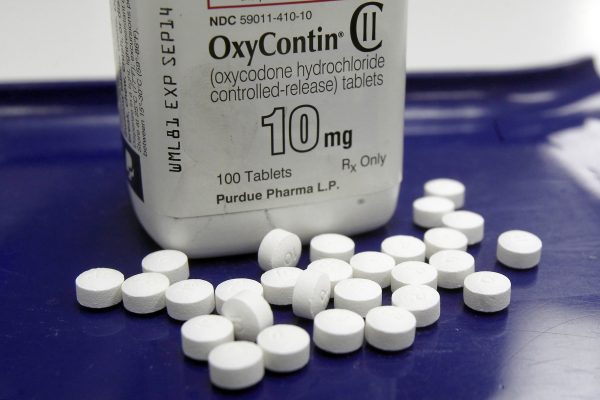Acting AG Underwood Announces Intent to Sue Purdue Pharma Over Opioids
The statement of intent to sue the Stamford, Connecticut-based maker of OxyContin comes after a September 2017 announcement by a bipartisan coalition of 41 state attorneys general of an investigation into the role of major pharmaceutical companies in the current opioid epidemic.
May 17, 2018 at 03:09 PM
5 minute read
 Purdue Pharma's OxyContin pills. (AP Photo/Toby Talbot, File)
Purdue Pharma's OxyContin pills. (AP Photo/Toby Talbot, File) Acting New York Attorney General Barbara Underwood and Gov. Andrew Cuomo have announced the state intends to file a lawsuit against Purdue Pharma over its marketing of opioid pain medication.
The statement of intent to sue the Stamford, Connecticut-based maker of OxyContin comes after a September 2017 announcement by a bipartisan coalition of 41 state attorneys general of an investigation into the role of major pharmaceutical companies in the current opioid epidemic.
“After a lengthy investigation, we are preparing a lawsuit against Purdue Pharma for its alleged deception and reckless disregard for the health and well-being of New Yorkers. It is clear to us that Purdue profited by deliberately exploiting New Yorkers' addictions, and by pushing health care providers to increase patients' use and dependence on these potentially fatal drugs,” Underwood said in a statement released on Wednesday.
“In addition to our impending lawsuit against Purdue, our office will continue to lead the multi-state investigation of opioid manufacturers and distributors across the country,” she said.
In response, a spokesman for Purdue Pharma said in an emailed statement Thursday: “We are disappointed that after months of good faith negotiations working toward a meaningful resolution to help the state of New York address the opioid crisis, the attorney general has unilaterally decided to pursue a costly and protracted litigation process. We vigorously deny these allegations and look forward to the opportunity to present our defense.”
The spokesman also pointed out that the privately held company stopped promoting opioid medications to prescribers in February.
At least six other states besides New York also are saying they intend to sue Purdue Pharma in connection with the opioid abuse epidemic. Florida already filed a complaint in state court on May 15 against Purdue and four other opioid makers as well as three drug distributors.
The Florida complaint alleged that the drug companies made misrepresentations about the addictiveness of their medications in order to increase prescribing and patient use despite the risks. The complaint further alleged that the manufacturers funded front organizations to tout the drugs and paid medical experts who were presented as neutral to endorse the painkillers while downplaying the risk of addiction. The lawsuit seeks damages and restitution plus attorney fees and legal costs as well as injunctive relief under the Florida RICO Act and state Deceptive and Unfair Trade Practices Act.
John Parker, senior VP of the Healthcare Distribution Alliance, a trade group, said in a statement that, “given our role, the idea that distributors are responsible for the number of opioid prescriptions written defies common sense and lacks understanding of how the pharmaceutical supply chain actually works and is regulated. Those bringing lawsuits would be better served addressing the root causes, rather than trying to redirect blame through litigation.”
The attorneys general of Nevada, Texas, North Carolina, North Dakota and Tennessee similarly are accusing Purdue Pharma of violating state consumer protection laws. Sixteen other states and Puerto Rico already have sued Purdue, and California and Massachusetts also have announced intent to sue, according to Reuters news agency.
Mounting state litigation against drugmakers comes as numerous counties and municipal governments across the United States—including more than half the counties in New York state —already have filed lawsuits in county, state and federal courts blaming opioid manufacturers for the U.S. epidemic of prescription painkiller and heroin abuse, often assisted by plaintiff firms such as Simmons Hanly Conroy, leading some to compare the litigation to Big Tobacco.
In 2015, then-New York Attorney General Eric Schneiderman announced that New York had reached a settlement with Purdue requiring the company to change its marketing practices around oxycodone, the generic name for brand name extended-release formula OxyContin, following an investigation opened in 2013. Between the 1990s and 2011, oxycodone prescriptions more than doubled in the United States and sales of oxycodone increased more than tenfold, the AG's Office said at the time, and 10 percent of oxycodone prescriptions in the state were for OxyContin.
In the United States, 63,632 drug overdose deaths occurred in 2016, the last year for which figures are available. Opioids were involved in more than 66 percent of drug overdose deaths, according to data released in March by the Centers for Disease Control and Prevention.
This content has been archived. It is available through our partners, LexisNexis® and Bloomberg Law.
To view this content, please continue to their sites.
Not a Lexis Subscriber?
Subscribe Now
Not a Bloomberg Law Subscriber?
Subscribe Now
NOT FOR REPRINT
© 2025 ALM Global, LLC, All Rights Reserved. Request academic re-use from www.copyright.com. All other uses, submit a request to [email protected]. For more information visit Asset & Logo Licensing.
You Might Like
View All
DOJ Supports Appointing US Judge Backed By Trump to Review Mar-a-Lago Documents
3 minute read

Jay-Z, Quinn Emanuel Say AAA Offers Only 'Token' Black Arbitrators
Trending Stories
- 1US Judge Dismisses Lawsuit Brought Under NYC Gender Violence Law, Ruling Claims Barred Under State Measure
- 24th Circuit Upholds Virginia Law Restricting Online Court Records Access
- 3Lawsuit Against Major Food Brands Could Be Sign of Emerging Litigation Over Processed Foods
- 4Fellows LaBriola LLP is Pleased to Announce that Alisha Goel Has Become Associated with The Firm
- 5Law Firms Turn to 'Golden Handcuffs' to Rein In Partner Movement
Who Got The Work
J. Brugh Lower of Gibbons has entered an appearance for industrial equipment supplier Devco Corporation in a pending trademark infringement lawsuit. The suit, accusing the defendant of selling knock-off Graco products, was filed Dec. 18 in New Jersey District Court by Rivkin Radler on behalf of Graco Inc. and Graco Minnesota. The case, assigned to U.S. District Judge Zahid N. Quraishi, is 3:24-cv-11294, Graco Inc. et al v. Devco Corporation.
Who Got The Work
Rebecca Maller-Stein and Kent A. Yalowitz of Arnold & Porter Kaye Scholer have entered their appearances for Hanaco Venture Capital and its executives, Lior Prosor and David Frankel, in a pending securities lawsuit. The action, filed on Dec. 24 in New York Southern District Court by Zell, Aron & Co. on behalf of Goldeneye Advisors, accuses the defendants of negligently and fraudulently managing the plaintiff's $1 million investment. The case, assigned to U.S. District Judge Vernon S. Broderick, is 1:24-cv-09918, Goldeneye Advisors, LLC v. Hanaco Venture Capital, Ltd. et al.
Who Got The Work
Attorneys from A&O Shearman has stepped in as defense counsel for Toronto-Dominion Bank and other defendants in a pending securities class action. The suit, filed Dec. 11 in New York Southern District Court by Bleichmar Fonti & Auld, accuses the defendants of concealing the bank's 'pervasive' deficiencies in regards to its compliance with the Bank Secrecy Act and the quality of its anti-money laundering controls. The case, assigned to U.S. District Judge Arun Subramanian, is 1:24-cv-09445, Gonzalez v. The Toronto-Dominion Bank et al.
Who Got The Work
Crown Castle International, a Pennsylvania company providing shared communications infrastructure, has turned to Luke D. Wolf of Gordon Rees Scully Mansukhani to fend off a pending breach-of-contract lawsuit. The court action, filed Nov. 25 in Michigan Eastern District Court by Hooper Hathaway PC on behalf of The Town Residences LLC, accuses Crown Castle of failing to transfer approximately $30,000 in utility payments from T-Mobile in breach of a roof-top lease and assignment agreement. The case, assigned to U.S. District Judge Susan K. Declercq, is 2:24-cv-13131, The Town Residences LLC v. T-Mobile US, Inc. et al.
Who Got The Work
Wilfred P. Coronato and Daniel M. Schwartz of McCarter & English have stepped in as defense counsel to Electrolux Home Products Inc. in a pending product liability lawsuit. The court action, filed Nov. 26 in New York Eastern District Court by Poulos Lopiccolo PC and Nagel Rice LLP on behalf of David Stern, alleges that the defendant's refrigerators’ drawers and shelving repeatedly break and fall apart within months after purchase. The case, assigned to U.S. District Judge Joan M. Azrack, is 2:24-cv-08204, Stern v. Electrolux Home Products, Inc.
Featured Firms
Law Offices of Gary Martin Hays & Associates, P.C.
(470) 294-1674
Law Offices of Mark E. Salomone
(857) 444-6468
Smith & Hassler
(713) 739-1250







